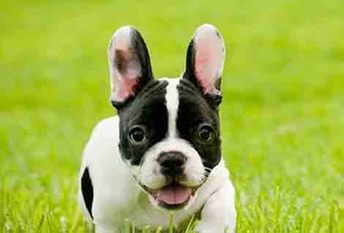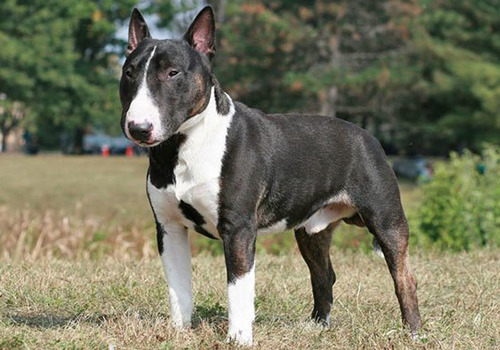Miniature Bull Terriers are very easy to groom. They only require weekly brushing in order to keep their coat looking shiny and to keep loose hair under control. They do shed heavily in the spring and fall, and brushing will need to occur daily. They don't require frequent bathing, and many owners use a dry shampoo or damp cloth to keep the dog looking and smelling fresh in between baths.
As with all dogs, the Miniature Bull Terrier's ears should be checked weekly for signs of redness and infection. Weekly cleaning with a veterinarian-approved cleanser can keep harmful bacteria from building up. Weekly tooth brushing will keep the teeth and gums healthy and prevent bad breath. Nail clipping may be required if the dog does not wear his nails down naturally.
The Miniature Bull Terrier is a highly active dog. He loves to run and play. A fenced-in backyard with plenty of toys will keep him happy however; a Mini Bull is quite happy living in a large apartment provided he is walked regularly.
Walks must be brisk and relatively long to keep him in great shape. Remember, he will still go rip-roaring through the house to stretch his leg muscles and… just to have fun. Without proper exercise, Miniature Bull Terriers often become destructive. They can tear up a house and destroy the furniture in no time at all. Exercise and mental stimulation through play are essential to the Miniature Bull Terrier’s well-being, as well as that of your belongings.
Mini Bulls are great family companions and will readily play with children for hours on end. They love to chase after balls and will be a great help to your child’s pitching arm. After a good game of catch, the Mini Bull will happily nap on the couch, snoring incessantly.
It is best to feed Miniature Bull Terriers a high-quality dry dog food. He should be fed once daily and never be fed freely, without limitations. Mini Bulls have a tendency to overeat and become overweight so owners must be fastidious about watching their dog’s weight. Your veterinarian can assess your dog to ensure that he is at his optimum weight.
Any diet should be appropriate to the dog’s age (puppy, adult, or senior). Treatscan be an important aid in training, but giving too many can cause obesity.
Learn about whichhuman foodsare safe for dogs, and which are not. Check with your vet if you have any concerns about your dog’s weight or diet.Clean, fresh water should be available at all times.
The average life span of the Miniature Bull Terrier is 10 to 12 years. Their most serious health issue is a strong breed predisposition to blindness caused by lens dislocation, which typically shows up at or after 3 years of age. Other breed health concerns may includeallergies, congenital deafness (in whites), compulsive tail chasing,entropion, mitral valve dysplasia and subaortic stenosis. A minor breed “weakness” is its tendency to fall asleep on its owner’s lap and snore loudly.
Miniature Bull Terriers are bright dogs but their attention spans are rather short. Training sessions will be more beneficial if they are kept short but are repeated often. Praise and rewards with yummy little treats work better for Mini Bulls than harsh words, yelling or discipline.
Consistency is important with this breed. They can become confused if one day he is allowed to lie on the couch and the next day he is not. Being consistent, calm and assertive will help you to train your Miniature Bull Terrier into a wonderful and well-mannered companion.
Mini Bulls tend to do well in AKC Obedience Trials. Quite a few are certified as Therapy Dogs and visit people in hospitals and nursing homes. Most Miniature Bull Terriers are perfectly happy being the love of a family’s life.











